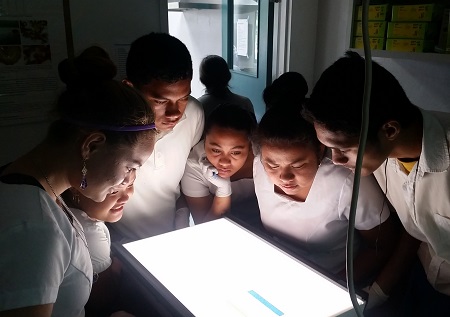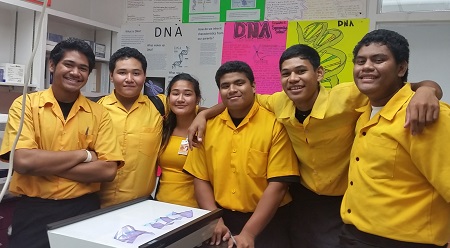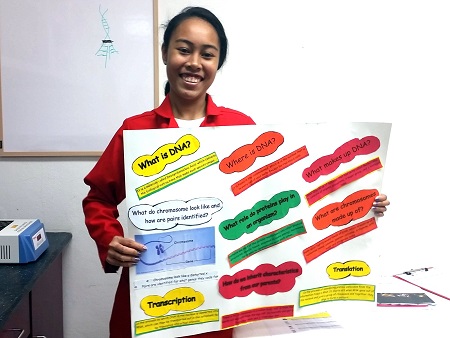
Samoana High School students check out the bands composed of segments of DNA on an electrophoresis gel. The students extracted and amplified the DNA segments in the ASCC Land Grant molecular biology lab as part of the Molecules of Life Explorations program offered by the Department of Education and ASCC Land Grant. L to R: Princess Pulu, Theresa Ping, Rudy Fiso, Diana Uhrle, Finiana Finau, and Fernandez Gago.

Nuuuli Polytech High School students in the ASCC Land Grant molecular biology lab. The students are among the 41 so far who have completed the four-week Molecules of Life Explorations program offered during the 2015-16 school year by the Department of Education and ASCC Land Grant for top students selected from local high schools. The intensive program gives students a unique chance to practice some of the basic procedures used in biomedical laboratories, including DNA extraction, amplification, and electrophoresis. L to R: Christian Tuese, Fa’afetai Paga, Jessica Fa’afetai, Kevin Fealofani, Utumoe Va’a, and Felise Misi.

Fagaitua High School student Jemima Telesia Nafatali shows her poster outlining the structure and function of the molecules that make up the genetic material of every living thing. Nafatali is one of 96 students chosen to participate in the ASCC Land Grant/Department of Education Molecules of Life Explorations program in which students get hands-on experience analyzing DNA in the Land Grant molecular biology laboratory.

Samoana High School students check out the bands composed of segments of DNA on an electrophoresis gel. The students extracted and amplified the DNA segments in the ASCC Land Grant molecular biology lab as part of the Molecules of Life Explorations program offered by the Department of Education and ASCC Land Grant. L to R: Princess Pulu, Theresa Ping, Rudy Fiso, Diana Uhrle, Finiana Finau, and Fernandez Gago.

Samoana High School students check out the bands composed of segments of DNA on an electrophoresis gel. The students extracted and amplified the DNA segments in the ASCC Land Grant molecular biology lab as part of the Molecules of Life Explorations program offered by the Department of Education and ASCC Land Grant. L to R: Princess Pulu, Theresa Ping, Rudy Fiso, Diana Uhrle, Finiana Finau, and Fernandez Gago.
ASCC-CNR/DoE Offer Molecular Biology Instruction to High School Students
January 29, 2015
By James Kneubuhl, ASCC Press Officer
The Community and Natural Resources (CNR) division of the American Samoa Community College (ASCC) offers the Territory’s public and private high school students the opportunity to gain an edge in their science studies by participating in Molecules of Life Explorations, a series of weekly two-hour session in which students participate in discussions about principles and practice of molecular biology and prior to engaging in hands-on lab activities.
A collaborative effort between ASCC-CNR, the American Samoa Department of Education (DoE), Office of Curriculum and Instruction (OCI) Science and Pacific STEP UP, Molecules of Life Explorations offers training to high school juniors and seniors in basic molecular biology methods and life science laboratory techniques that is not otherwise available in American Samoa. It provides a critical introduction to help prepare students for college-level life coursework while giving them a hands-on feel for the biomedical sciences that is essential for advanced studies or even careers in the field.
The program, provided without charge to the students, has been underway since September of 2015 and will continue through May of this year. At total of 96 student applicants, divided into 16 groups of six, spend two hours a week during normal school hours at ASCC-CNR for a total of four weeks per group during a morning or afternoon session. DoE instructors, OCI Specialists and ASCC-CNR staff provide training and supervision. Instruction includes proper safety precautions and techniques for molecular-level analysis of the macromolecules responsible for biological activity—techniques commonly employed in molecular biology labs around the world.
As part of their work, the students extract and amplify regions of their own DNA using the polymerase chain reaction and determine their genotypes using gel electrophoresis. DNA extraction, PCR amplification, and gel electrophoresis are techniques commonly employed in biomedical facilities around the world, including clinical diagnostic labs in hospitals, police forensic labs, and life sciences research labs. This type of training in basic molecular biology methods and life sciences laboratory techniques provides a critical introduction to college-level coursework.
Weekly lectures and discussions are facilitated by Dr. Joserose Jyothibhavan, Science Specialist with DoE-OCI, while hands-on laboratory activities are led by Emily Ilaoa, ASCC Land Grant Plant Pathology Research Assistant. Dr. Joserose and Ms. Ilaoa are assisted by Plant Pathology and Entomology Research Assistants Shalley Tailevai and Metotagivale Meredith. ASCC Land Grant Plant Pathologist Dr. Ndeme Atibalentja provides critical technical backstopping for planning and developing the program activities. Participants were selected from applications submitted by high school juniors and seniors to their science teachers. Requirements included the students having a GPA of 3.5 and above, having completed of Physical Science, Biology, and Algebra 2, and being currently enrolled in Chemistry or Physics and Pre-Calculus or Calculus.
The Molecules of Life Explorations program utilizes the molecular biology laboratory established at ASCC-CNR via the Pacific STEP-UP program. STEP-UP, funded through the U.S. National Institutes of Health, is coordinated in the Pacific by Dr. George Hui at the University of Hawaii John A. Burns School of Medicine. STEP UP aims to increase the number of Pacific Islanders and other underrepresented persons entering careers in biomedical research. In addition to the Molecules of Life Explorations program, STEP-UP American Samoa offers summer internships with local scientist mentors for selected high school juniors and seniors. ASCC-CNR and Doe-OCI work together to implement both the Molecules of Life program and the STEP-UP summer internships program in the territory.
“For the most part, the students have done a great job,” said Dr. Joserose, “and based on the success of the program so far, we hope to offer Molecules of Life again during the next academic year beginning in August 2016.” For further information on Molecules of Life, contact Dr. Joserose Jyothibhavan or Ms. Magdalene Augafa-Leauanae of DoE-OCI 699-6516, or Dr. Mark Schmaedick of ASCC-CNR at 699-9155.
